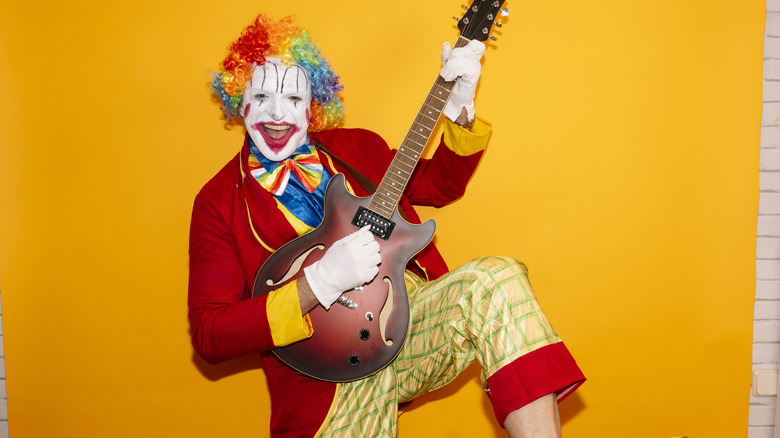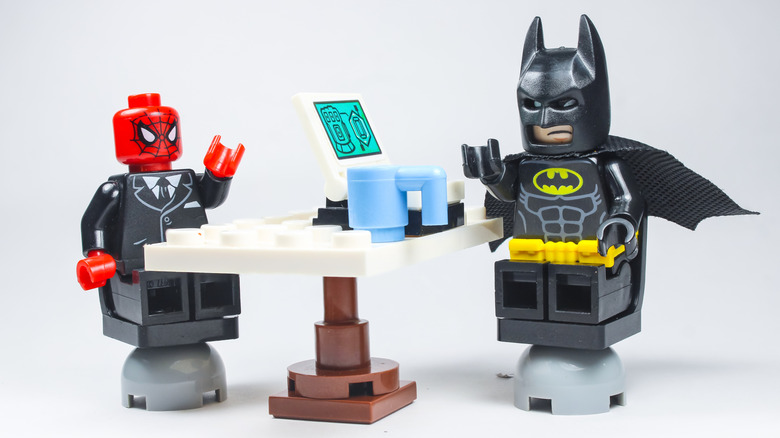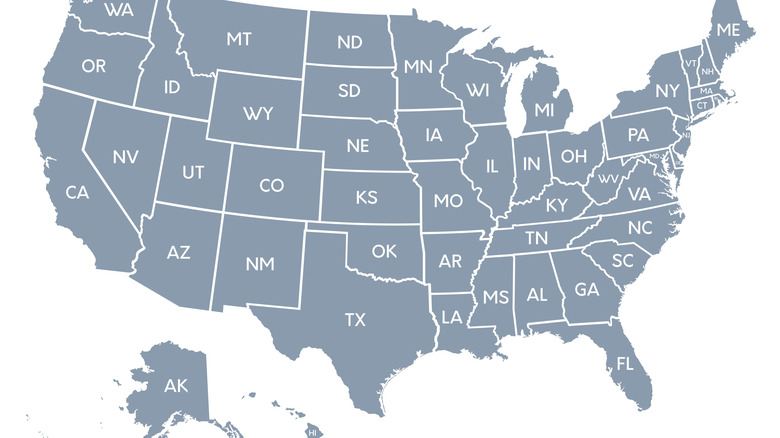The Most Bizarre Job Interview Questions Companies Actually Asked
When you're applying for a job, in many cases, getting through a job interview is perhaps the main prerequisite that stands between you and employment. Let's be honest: No one enjoys being put on the spot so that they can have their educational background and work experience (or lack thereof) thoroughly scrutinized, yet anyone who has to sit through one of the dang things tries their best to pass with flying colors. Researchers have objectively identified three main goals of job interviewers: to assess the applicant, to create a positive impression of the company, and to give the applicant more information about exactly what they're getting themself into. With that in mind, it's reasonable to expect the questions to be about topics related to the job and the applicant.
One would think that only the most fun jobs in the entire world would have interviews peppered with whimsical questions. But surprisingly, many companies (including some really well-known ones) have a well-documented habit of asking bizarre things that have nothing to do with the job. In those situations, the applicants who do well are the ones who think on their feet and don't easily get shellacked by silliness, including the following most offbeat, oddball, out-of-left-field questions that people actually asked in job interviews.
Can you tell me 10 things you could do with a pencil other than write?
Put a pencil in the hands of an artist, and you can expect their imagination to start flowing from fingers to paper. But how creative can a person be when it comes to thinking of unconventional ways of putting this classic writing tool to use?
Casie Grammer, a customer success manager for airCFO, shared with Medium that she liked to ask this question because it was "a nice break from traditional accounting questions, and also shows how well candidates can think on their feet." While she did get a few rather pedestrian answers (e.g., for erasing), some genuinely took her by surprise, including this "honest and funny" response from a person who passed their interview: an instrument for plucking out earwax that inadvertently gets stuck in headphones. As Grammer put it, "Come on, most of us have done it!"
How much does a Quarter Pounder weigh?
As a world-renowned fast food brand, one could say that McDonald's takes its food offerings seriously. Its job interviews, on the other hand? Not that much, apparently. From cashier candidates being asked if they could gobble up 20 McNuggets in under five minutes to quizzing potential servers on whether the humble tomato is a vegetable or a fruit, one can almost imagine Ronald McDonald himself conducting these interviews.
But when it comes to prospective burger flippers, the interview question that takes the cake (er, burger?) is one that pretty much answers itself. After all, the weight of a Quarter Pounder is in its name: It's one-fourth of a pound. Then again, considering how A&W's short-lived Third Pounder from the 1980s (which was, well, one-third of a pound) ultimately failed because consumers thought it was actually lighter than a Quarter Pounder, perhaps the answer isn't that obvious.
Why is a tennis ball fuzzy?
The world is full of both natural and human-made curiosities, many of which we either don't notice or just accept without question. The signature fuzz of a tennis ball is one example; a person might only think about this when they have to pick one up after unsuccessfully trying to swat it with a racket. But if you've ever applied as a client manager for Xerox, you may have had to ponder this on the spot (and perhaps even asked yourself, "What the heck does this have to do with the job?").
There is, of course, a real answer (the textured surface affects the ball's bounce, control, and trajectory during games), but it's still a strange thing for a print company to ask. Most likely, it's meant to test how observant the candidate is when it comes to the tiniest or most mundane details — a crucial trait for someone whose job is to manage relationships between the company and its client.
You're a new addition to the crayon box. What color would you be, and why?
Depending on the kinds of sets you had access to as a child, some crayon colors may seem more essential than others. Still, you can't deny that there was even just a tiny sense of excitement every time you or a playmate would pull out a new, unfamiliar, and elegantly named color (like "cerulean" or "periwinkle") from one of the bigger crayon sets.
Maybe Urban Outfitters wanted to recapture that thrill when it included this question in their list of things to ask sales associate candidates. Given the products that the brand offers, it's hardly surprising that the question is deeply associated with colors. But beyond offering clues about the candidate's personality and mindset based on their color preference, the way the question is constructed (and thus, the way the candidate would answer it) also sheds light on their understanding of what "new" is (e.g., unfamiliar, never seen before, etc.), which is crucial for a lifestyle brand that needs to stay trendy.
Can you say, 'Peter Pepper Picked a Pickled Pepper' and cross-sell a washing machine at the same time?
Ask anyone who has ever worked a customer service job — especially call center agents — and they'll likely tell you how it can sometimes feel like a juggling act. It's even more complicated when the job involves walking customers through step-by-step troubleshooting in real time (or worse, when the customer in question is irate and impatient). This is probably why MasterCard asks call center agent applicants this silly question that, at first, seems to have nothing to do with the job.
With that said, if you're the kind of person who can handle a classic tongue-twister (albeit a slightly altered version of it) while convincing that couple who approached you to buy your newest washing machine model, it could mean you're perfect for the job: someone who can speak quickly and audibly when discussing difficult or even unconnected topics.
How would you find the words that became obsolete in the English language between the 16th and 17th century?
Uber reportedly asked this question in job interviews for its software developer position, which might seem a bit out of place at first. But it's likely meant to gauge the candidate's approach to thinking about how to simplify what initially seems like a very complicated problem. According to Glassdoor users, the interviewer also specified that the candidate could use a search engine for this — meaning this is also a test of how the potential hire would code such a function (which is highly relevant to the job).
There are indeed a number of excellent online sources that candidates can tap for the answer, including the advanced search function of the Oxford English Dictionary website. Another is an actual dictionary of unusual words called The Phrontistery (which also helpfully omits obsolete English words from the pre-1600s).
How many snow shovels were sold in the U.S. last year?
A question like this would reasonably take anyone aback, but there's actually a numeric approach to figuring this out. It would involve taking certain details into consideration, such as the number of people living in states that would need at least one snow shovel in every home, the number of households in said states, and even the average lifespan of a snow shovel (i.e., how often it would need replacing).
You may still wonder why an employer like Axon (formerly known as TASER International, Inc.) would ask this as part of its interviews for a leadership development program, and the fact that the company mainly deals in developing technology for public safety and security makes this question relevant. Only a person with at least a passing knowledge of some of the details mentioned above would stand a chance of offering a logical (not necessarily correct) answer, thereby proving their suitability for selection.
Similarly, Meta/Facebook supposedly asks its risk analyst candidates to guess the number of vacuums in America, although the company didn't specify if the number strictly pertains to sold items, which means this might be referring to total production.
How many square feet of pizza is eaten in the U.S. each year?
When you hear the name Goldman Sachs, your first thoughts are most likely "finance," "wealth," or "investment banking" — not "pizza." Yet this dough-based dilemma is reportedly one of the questions asked during the company's programmer analyst hiring interviews. Given that the job of a programmer analyst involves troubleshooting and customizing computer programs based on the needs of the company's customers, this question is likely intended to measure two things: the interviewee's familiarity with the U.S. customer base, and their ability to infer conclusions based on numbers and statistics.
Then again, this is the company that asks potential software engineering interns how to identify the heaviest among eight imaginary balls (in the fewest number of steps) and quizzes summer analysts on their estimates for the number of grocery stores across America, so maybe Goldman Sachs interviewers just really, really like "guesstimate" questions.
Are you a lucky person?
In February 2020, Dan Rose, Amazon's former business development director, tweeted an interesting bit of trivia about company founder Jeff Bezos: "When I worked at Amazon 1999-2006, Jeff Bezos' favorite interview question was 'are you a lucky person?'" Why the e-commerce giant's big boss loved to ask this seems to have something to do with how much he values intellectual humility, at least according to the people who have worked with and under him.
According to Basecamp founder Jason Fried (via Inc), Bezos pegs people who are "open to new points of view, new information, new ideas, contradictions, and challenges to their own way of thinking" as the smartest. Rose, on the other hand, not only emphasized how the question spotlights optimism and humility as crucial traits for hires, but also shared two "wrong" answers: both responses downplay luck and stress the interviewee's self-perceived strength, which are reportedly huge no-nos for Bezos.
Other companies that may be interested in similarly exploring questions related to fortuitousness could take a leaf out of Norwegian Cruise Line's book. According to Glassdoor users, "Do you believe in Bigfoot?" is a question that the company actually asks casino marketing coordinator candidates (perhaps due to the "luck" connection between winning at gambling and seeing this mythical beast).
How would you describe the color green to a blind and deaf person?
Before becoming an SEO manager for a different company, Cassidy Barney applied for a position at GNC as an associate to work the registers at one of the health nutrition brand's small town stores. She shared (via Medium) that during the job interview, she was asked this weird question by the branch manager. "The interview was going fine, all of the normal questions asked, and then she asks that question," shared Barney, adding that she admitted to the interviewer that she had no clue how to reply.
Turns out, she wasn't alone. "[The interviewer] then moved away from the question, so I said, 'What's the answer you were looking for? How would you answer that?'" To Barney's surprise, the interviewer didn't know, either. Given how the person in the hypothetical situation is incapable of both sight and hearing, this is certainly a communication problem that requires a fair bit of thinking — maybe more than one could manage in a time-restricted job interview.
Have you ever stolen a pen from work?
Few would ever openly admit to committing petty crimes, even in casual conversations. With that in mind, could you ever see yourself telling a potential employer that you've had a history of light-fingered behavior in your previous workplaces? Still, this hasn't stopped Jiffy Software from (reportedly) asking potential software architect hires this lightly incriminating but arguably inconsequential question (after all, who hasn't accidentally pocketed a pen or other small stationery item at some point, right?).
Perhaps the interviewer wanted to test the honesty of the applicant, or they wanted to gauge how the candidate would craft a response to an uncomfortable question under time pressure. The interview candidate who recalled being asked this question said (via Glassdoor) that "it was scary, the amount of information [the company] knew about [the applicant]," so maybe the question was a jestful flex on the company's part, too.
How many cows are in Canada?
When the subject of fun workplaces gets brought up, Google often gets mentioned. And while there are plenty of secrets Google doesn't want you to know, it's no surprise to hear that the company best known for its search engine would include an oddball question or two in its job interviews. For example, if you're applying for the local data quality evaluator position, it's possible that you'll get asked about the bovine population in the Land of the Maple Leaf. The interviewer may have thrown that in (or other similar questions) to gauge the candidate's familiarity with techniques for solving problems dealing with large numbers (e.g., order-of-magnitude approximations, back-of-the-envelope calculations) — basically, an assessment of mathematical aptitude and data analysis skills.
That said, Google is far from the only employer that likes to ask such questions. If you've applied for the associate consultant position of Bain & Co., for instance, the interviewer may have asked you to estimate the number of windows in New York. Meanwhile, Constant Therapy's senior marketing director, Brett Rudy, shared (via Medium) that Boston-based environmental non-profit organization Earthwatch asked him about the number of gas stations in the United States during his interview for the marketing director position. His guess as to why: "They wanted to see how I thought through a problem logically."
If you had turned your cellphone to silent, and it rang really loudly despite it being on silent, what would you tell me?
If a device comes with a built-in function, it's natural to expect the device to behave according to said function's directives when it is activated. Thus, the very premise of this zany question — supposedly asked by consumer goods company Kimberly-Clark during its biomedical engineer job interviews — assumes that your cellphone didn't do what it was supposed to do.
Perhaps, that's the point — and maybe what the interviewer really wanted to know was how the candidate would address a problem that was specifically not supposed to happen under the given circumstances. There are, of course, many possible reasons why this would happen (like a device malfunction or human error), but it's in crafting the explanation (or excuse) that the candidate can really demonstrate how quickly they can think on their feet.
If you could throw a parade of any caliber through the Zappos office, what type of parade would it be?
Zappos is a U.S.-based online apparel retailer, so it makes sense that at least a few of its job interview questions would require a bit of creative thinking. But this one, which Zappos Family interviewers supposedly ask customer loyalty team member applicants, can be a bit disarming. Then again, some Glassdoor users' answers to the question — ranging from "a costume parade" to "clowns dressed up as dinosaurs riding unicycles while juggling live sharks which are also dressed as dinosaurs" — demonstrate that at the very least, potential applicants are aware of what to expect if they get successfully hired by Zappos. Or, as one user put it, "This is not an unusual question if you are at all familiar with the Zappos.com culture."
The colorful nature of this question brings to mind another delightfully rainbow-colored puzzler, courtesy of the now-defunct big-box retailer Bed Bath & Beyond. Reportedly, "If you were a box of cereal, what would you be and why?" was a question that sales associate candidates would encounter in their interviews. Aside from testing how creatively the candidate answers unconventional questions, there's also the association between comfortable home living and a nice, big bowl of cereal.
How many quarters would you need to reach the height of the Empire State Building?
It's admittedly challenging to imagine anyone (except maybe the most bored individuals) would find any reason to find an answer to this question, but JetBlue Airways Corporation apparently did. As one of the questions it supposedly asks potential pricing/revenue management analysts, it sort of makes sense (since it involves both altitude and money).
One way to answer this question correctly, provided you have all the necessary data at hand, would be to crunch the numbers. From its base to the tip of its antenna, the Empire State Building stands at 1,454 feet (about 443 meters). Meanwhile, a U.S. quarter is 0.069 inches (1.75 millimeters) thick. Plugging in the numbers (i.e., converting the height of the building to the same unit of measurement as the coin's thickness, then dividing the former by the latter) yields the answer: You'd need almost 252,870 quarters stacked on top of each other.
What do you think about when you are alone in your car?
For folks with a car, the moments during their day when they're alone while stuck in traffic can be quite inconvenient, but it can also offer them a valuable opportunity for introspection. After all, in a 2024 national survey of 1,000 people in the U.S., more than half said that having sufficient "alone time" is very important to their mental health (via Ohio State University Wexner Medical Center). Perhaps that's why Gallup, a management consulting company with a focus on leadership empowerment, asks potential associate analysts about where their minds go during this part of their day.
Additionally, there are many things an interviewer can learn about a candidate based on the way they answer this question; for instance, a person who's quick to anger might find themself complaining about the incompetence of the driver in front of them, while a creative person might daydream about their next art project or write a song in their head.
A penguin walks through that door right now wearing a sombrero. What does he say and why is he here?
More often than not, oddball job interview questions have some sort of underlying logic: maybe the interviewer wants to see a potential hire's hidden traits or test the limits of a candidate's patience. But if you've ever applied to be an office engineer at Clark Construction Group, you probably didn't bother thinking about the "why" when you got asked this absurd question.
Still, the sheer ridiculousness of this query was enough for at least one other employer to include it in their repertoire of interview questions. According to Marti Maltby, the director of Peace House Community, this became his favorite question to ask after reading it in "a list of questions employers could ask potential employees to test their creativity and their ability to adjust quickly to unexpected circumstances." The responses he received ranged from straight-faced seriousness ("I don't know, I don't speak penguin") to straight-up laughter.
What is your gun noise?
Sometimes, interviewers like to ask weird questions to make sure that they won't end up hiring qualified candidates who are terrible fits for their company culture. Take the case of the London School of Make-Up, for example. HR consultant Steve Pritchard told Medium that, in order to find hires that "have a personality and a good sense of humour," they came up with the idea of asking applicants how they would sound like if they were a literal gun.
"We felt that it would be a good way to test their ability to relax and have a laugh in a pressure situation, as well as to see how witty they are," shared Pritchard, who admitted that he was expecting to hear shotgun or even machine gun imitations. Unfortunately, it seemed like the question's potential blew up like gunpowder the first time they actually decided to ask it — the candidate was silent for a long time, and then simply said, "Bang." As Pritchard lamented, "It's not a question we've used again since."
What's the color of money?
On the surface, this question — attributed to the American Heart Association, and supposedly asked of candidates applying for the position of project manager — may seem too simple and obvious. Some interviewees might even answer "green" automatically, given the color's strong association with U.S. currency. But therein lies the brilliance of this question, because there is no single answer to it.
Remember that depending on where you are in the world and the denomination and currency of the money in question, the answer differs. Coins in the U.S., for instance, are typically silver or bronze, while paper bills are predominantly green. Meanwhile, countries like the Philippines have bills that come in blue, yellow, green, purple, red, and orange, as well as coins that are gold, silver, or a combination of the two. In other words, this question is more than a simple test of color perception; it's a way to gauge how quickly the candidate's mind works in terms of considering all the potential factors in a given situation before coming to a conclusion, which is a crucial characteristic for a project manager.
How would you explain what Adobe is to your grandma?
Generally, a deal desk analyst acts as the connective tissue between the different departments in a company (e.g., finance, legal, marketing, or sales) that are crucial to closing deals. As such, they are expected to talk to different kinds of people, each with their own sets of technical jargon and varying levels of understanding about a company's particular products or services. This is likely why Adobe snuck in this question when interviewing prospective hires for the position.
A variation of the common "explain x like I'm 5" question, "explain x to an elderly person" basically asks you to demonstrate how you would use simple and clear language to make a technical or unfamiliar concept easier to understand, and in particular for someone who lacks a deep knowledge of or relevant experience. So if you can explain what the company is to someone outside of the typical target demographic of its products, it's a sound assumption that the task of getting everyone in the company on the same page is something you can handle.
Who would win a fight between Spider-Man and Batman?
Comic book fans love to ponder the outcome of what would happen if their favorite characters — regardless of which universe they're from — would fare in a no-holds-barred fight against each other. But this is the caliber of discussion you would expect in the comments section of a pop culture website article, not a job interview in the hallowed halls of Stanford University. Still, this question was reportedly part of the job interview for that institution's Medical Simulationist position, which may seem like an out-of-left-field question for such a serious position.
So, who would really win: Marvel's amazing arachnid, or DC's Dark Knight? Well, it doesn't take a rocket scientist to figure out that the most realistic answer to this question is "Whoever the comic book writer wants to win." But looking at it from that angle, it becomes clearer that the question ties in to the "simulation" aspect of the job quite nicely, which requires "harness[ing] the power of simulation to create realistic and controlled environments for training and educational purposes" (via SimZine).
(Speaking of rocket scientists, here are some things people get wrong about working at NASA.)
If you were a pizza deliveryman, how would you benefit from scissors?
There are numerous accounts of Apple asking bizarre questions to potential hires. One of the most bewildering examples is this oddball query that the tech giant's interviewers throw at specialist applicants. After all, if your main job is simply to deliver pizzas from the store to someone's door, it's not easy to think about a step anywhere between that process where two levers and two wedges screwed together could be essential. Realistically, all you'd need are a functioning motorcycle, hands, and a digital map, right?
But since the job of an Apple specialist is to help customers "[identify] ownership opportunities, [present] products and services, and [educate them] on relevant ways to buy products," what this question is really asking is "How would you sell scissors to a pizza deliveryman?" (Granted, it doesn't exactly make the question considerably easier to answer, but at least the relevance is clearer.)
How would you test an elevator?
Microsoft supposedly asks this question to candidates for its software development engineer position. It makes sense, though: Troubleshooting is part of a software development engineer's job, and this oddball question is a great way to measure that, despite the fact that it's about an invention that has been around for more than a century.
Additionally, there's a correct way to answer this question; for example, depending on where you are in the world, elevator load tests follow certain legally mandated specifications and restrictions. But perhaps, what gives additional gravity (pun fully intended) to this question is the fact that the product in question is one that rarely gets periods of "rest," gets used by a lot of people simultaneously, and can present a very real safety risk if it malfunctions (though mercifully rare; being stuck in a free-falling elevator is one of the worst ways to die, according to scientists).
If you were to get rid of one state in the U.S., which would it be and why?
Being made to pick which U.S. state to eliminate is a bizarre question in any setting. How would you even go about choosing — and more importantly, what would your choice say about you? This is the kind of data that Forrester Research was likely interested in when it added this to a list of interview questions for research associate candidates.
Obviously, removing a state is anything but simple, and merely pondering the question is likely to lead anyone down a rabbit hole of legal loopholes and even political biases, which, when discussed in workplace settings, tends to have more negative outcomes than positive ones. Regardless, there is still some merit to asking this, as it's likely to inform the interviewer about how the candidate tackles difficult discussions (and how carefully they deliver answers to delicate questions with the potential to be politically charged).
On a scale from 1 to 10, rate me as an interviewer.
Some of the worst jobs in history involve a considerable amount of personal risk. But what if the final question in your job interview puts your overall chances of getting hired at risk?
As part of its interviews with prospective general laborers, Kraft Heinz job interviewers have reportedly asked candidates to give them a rating. Granted, it's an uncomfortable request by default, exacerbated by the fact that the person you'll be assessing is someone who has complete control over whether or not you'll get hired in the first place. But that just might be the point. Perhaps, the intent is to gauge exactly how the person would answer a difficult question — one that might require a bit of tiptoeing on eggshells — when under pressure. Then again, would you honestly be able to tell your job interviewer straight to their face that they did a terrible job?
If we came to your house for dinner, what would you prepare for us?
Trader Joe's describes its crew as "some of the hardest working people [they] know," adept at "making sure that every customer has a fun, friendly and informative shopping experience." For this to be possible, it stands to reason that they should be able to get along well with each other.
Asking a candidate what kind of food they'd serve their workmate-houseguests provides insights into the level of camaraderie that sustains the work environment. It also highlights the kind of relationship the candidate would likely build with the rest of the team — say, would such a visit prompt the candidate to break out the good china? — and if the grocery retailer would truly be the best place for the candidate (or if they should look elsewhere).
(By the way, here's a list of jobs that won't exist in 10 years, in case you're weighing your career options.)


























